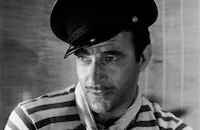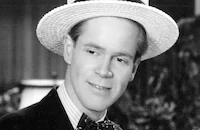Thunder Bay

Brief Synopsis
Cast & Crew
Anthony Mann
James Stewart
Joanne Dru
Gilbert Roland
Dan Duryea
Jay C. Flippen
Film Details
Technical Specs

Synopsis
Penniless but full of ideas, Steve Martin and Johnny Gambi, engineers who served in the Navy during World War II, walk down a quiet road on the gulf coast of Louisiana. Teche Bossier, owner of the Port Felicity Fish Co., agrees to drive them into the shrimping town of Port Felicity in exchange for five dollars. Upon reaching their destination, Gambi rents a shrimp boat from Dominique Rigaud, although the fisherman's daughter Stella distrusts the strangers immediately. Gambi and Steve use the boat to show potential investor Kermit MacDonough the location in which they plan to drill for offshore oil. Claiming that he has designed a drilling platform that can withstand any storm, Steve estimates that by investing one million dollars now, they will soon tap an oil reserve worth two billion. His enthusiasm is so infectious that MacDonough agrees to fund the project against the advice of his secretary, Rawlins. MacDonough warns Steve, however, that he must discover oil within three months, or his company, due to huge investments made in an offshore oil lease, will put them both out of work. Several weeks later, Gambi meets and falls for Stella's younger sister Francesca, but, according to custom, she has been betrothed since childhood to Philippe Bayard. After singing a love song in the Bon Chance, a local gathering place, Philippe is distressed to see Francesca enter with Gambi. Teche, who good-naturedly calls the oilmen "foreigners," agrees to help Steve and Gambi, but Stella, claiming that she learned about "their kind" during her stay in Chicago, refuses to accept Steve's statement that oil will be good for the town. Nevertheless, the outsiders hire a crew and begin their search for oil. When Teche sees them drop dynamite charges into the gulf, he begs them to stop, believing that the explosions will kill the shrimp and worsen an already dismal shrimping season. Steve maintains that the charges are safe, but Teche returns to town and incites the fishermen to form an angry mob. Steve finally scares them away by exploding sticks of dynamite behind them, and he placates Stella by warning Gambi to stay away from Francesca. "Go back to your people," Steve gently advises Francesca. With one month gone, Steve drives the building crew relentlessly, and the platform and rig are completed on schedule. Steve immediately orders the drilling crew to get started, and the exhausted Gambi is relieved when a hurricane warning gives the men an excuse to take the night off. Gambi and his men enter the Bon Chance with Francesca, and Philippe, furious, punches his rival and starts a brawl. The sheriff arrests the oilmen, and Francesca angrily denounces all the men. Determined to have Gambi fired, Stella visits Steve at the rig, where he explains that if he could pull up a resource that has been in the earth for millions of years, then he will truly have accomplished something. Stella finally abandons her suspicion and kisses Steve, but back in town, Philippe persuades Teche to help him destroy the oil rig. With the hurricane winds rising, Philippe climbs onto the platform and lights a bundle of dynamite, but Steve sees him and the two men fight. Philippe trips and disappears under the waves, and Steve, horrified, assumes that Stella was involved in Philippe's plot. The rig survives the storm, and in the morning, drilling begins. Eight days before the deadline, however, MacDonough visits Steve and sadly delivers the news: The board of his company, fearing a penalty for non-payment on their lease, has voted to stop the drilling operation on the following day. MacDonough has already spent all of his own money, and the crew is unable to work for no pay. At that moment, Gambi returns from town, announcing that he has just married Francesca. Steve punches Gambi, who loudly chastises Steve for having driven him and the men too hard. Steve tells them all to leave, intending to do the drilling himself, whereupon Gambi hesitates and then persuades the crew to remain. While the men are drilling, they discover that the troublesome shrimp that have been clogging the valves are actually the huge golden shrimp that have so long eluded the local fishermen. Later Steve takes Francesca to the rig, infuriating Dominique, who inflames the fisherman by declaring that the oilmen will steal their daughters and destroy the town. At Stella's request, Teche warns Steve that every boat in town is on its way to the rig. Feigning ignorance about the golden shrimp, Steve asks Teche if he can help him get rid of the creatures and then addresses the furious mob. Francesca's marriage is a happy one, he assures the men, and moreover, oil will bring progress to Port Felicity. Despite these words, the fishermen decide to destroy the structure, but at that moment, oil explodes through the rig and onto the platform. The fishermen discover that the golden shrimp bed is huge; consequently, the conflict between the oilmen and the fishermen is resolved. Teche then convinces Steve that Stella was not involved in Philippe's plot, and the lovers finally come together.

Director

Anthony Mann
Cast

James Stewart

Joanne Dru

Gilbert Roland

Dan Duryea

Jay C. Flippen
Marcia Henderson
Robert Monet

Antonio Moreno

Henry Morgan

Fortunio Bonanova
Mario Siletti
Antonio Filauri
Frank Chase
Allen Pinson
Dale Van Sickel
Ted Mapes
Elvin C. Alford
Ben Welden
Jean Hartelle
Jack Tesler
Adrine Champagne
Donald Green
Joseph Cefalu
Lee Vaccari
George F. Kelly Jr.
Laurie J. Vining
Emanuel Russo
Joseph Guidry
Milton Schneider
Louis Topham
Crew
Jack Bolger
Leslie I. Carey
Gil Doud
Oliver Emert
William Fritzsche
Russell A. Gausman
George W. George
Alexander Golitzen
Marshall Green
John Michael Hayes
John Michael Hayes
Joe Lapis
Lew Leary
Verna Maccurran
Rosemary Odell
Richard H. Riedel
Milton Rosen
Aaron Rosenberg
Russell Schoengarth
John Sherwood
Frank Skinner
George F. Slavin
Everett Smith
Joan St. Oegger
James Swartz
James Welch
Bud Westmore

Film Details
Technical Specs

Articles
Thunder Bay
This picture may be a minor credit for both Stewart and director Anthony Mann, but even a minor film from these artists is well worth watching. Stewart and Mann had just made three outstanding westerns together - two of them produced by Aaron Rosenberg, who also produced this one. Thunder Bay was described by many at the time (including Stewart) as a modern western with boats and oil standing in for horses and guns. Even Variety made the comparison in its review: "A modern plot that deals with offshore oil drilling, instead of being a costumed, western-localed story, gives this regulation outdoor actioner an interesting switch." Certainly Stewart's character of an obsessive entrepreneur is a variation on his edgy and neurotic cowboys in Bend of the River (1952) and The Naked Spur (1953). His costume may be different, but the character is fairly similar. Stewart's and Mann's next collaboration would be The Glenn Miller Story (1953), definitely not a western in any way, after which they returned to the genre they did best with The Far Country (1954).
Thunder Bay marked Universal Pictures' entry into the widescreen format craze of the day. The film's New York premiere featured the first use of 1.85:1 aspect ratio projection and a new three-speaker stereophonic sound system. Critics were impressed by these technical aspects as well as by William Daniels' outstanding color photography, shot on location in Morgan City, LA, and thirty miles out to sea on an oil barge. The movie itself, on the other hand, didn't cause any great shakes. "Sadly enough Thunder Bay does not appear to be the most impressive vehicle to launch sight or sound systems," wrote The New York Times. Nonetheless Thunder Bay did very well financially, no doubt helped by the topicality of its story. And of course, 1.85:1 eventually became the standard aspect ratio still used by the majority of Hollywood movies.
As for the new sound system, Variety offered an amazingly prescient warning which has been ignored far too often in recent years: "Exhibs will have to be careful of the stereophonic sound, however, because, as used at the preview, it can become a major distraction that greatly lessens a viewer's ability to stay with the story. The three-speaker setup shouldn't be used just as a noise-maker."
Producer: Aaron Rosenberg
Director: Anthony Mann
Screenplay: Gil Doud, George W. George, John Michael Hayes, George F. Slavin
Cinematography: William Daniels
Film Editing: Russell Schoengarth
Art Direction: Alexander Golitzen, Richard H. Riedel
Music: Frank Skinner
Cast: James Stewart (Steve Martin), Joanne Dru (Stella Rigaud), Gilbert Roland (Teche Bossier), Dan Duryea (Johnny Gambi), Jay C. Flippen (Kermit MacDonald), Marcia Henderson (Francesca Rigaud).
C-103m.
by Jeremy Arnold

Thunder Bay
Quotes
Can you, uh, juggle or anything like that? We might pick up a few bucks.- Johnny Gambi
I can imitate a movie star.- Steve Martin
Trivia
Notes
The New York Times reviewer commented that the 1.85 to 1 aspect ratio of Thunder Bay, although not as wide as CinemaScope's 2.55 to 1 ratio, was "pleasingly effective." The film also marked Universal's first use of stereophonic sound, which at the time was presentable only in select theaters. Some contemporary reviewers complained that the sound, with its use of three speakers, was loud and distracting. Publicity materials indicate that the picture was originally planned as a 3-D production. Although the character played by Jay C. Flippin is listed as "MacDonald" in reviews and CBCS, he is called "MacDonough" in the film. Similarly, Henry Morgan's character is listed as "Rawlings" in offscreen cast lists, but is called "Rawlins" in the picture.
According to the Hollywood Reporter review and news items, most of the picture was shot in Morgan City, LA, and some scenes were shot in New Orleans and on an oil-drilling barge thirty miles out in the Gulf of Mexico. Several reviewers did note that offshore oil drilling was a "headline subject" at the time. Thunder Bay marked the feature film debuts of Marcia Henderson and Robert Monet.















